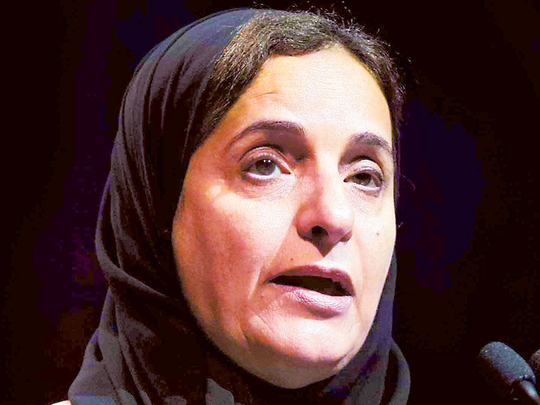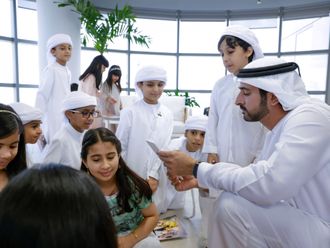
Abu Dhabi: In an era of violent rising intolerance and widening conflicts, the UAE stands solemnly as an incubator of tolerance and as an extemporary unique model of a leading cosmopolitan country with a myriad of cultures and nationalities living in peaceful coexistence and harmony on its soil, a top official said on Tuesday.
“The values of tolerance, respect for differences between people and convergence of many religions in a modern country were not born out of the appointment of a Minister of Tolerance earlier this year; they are authentic qualities of Emirati society and an integral part of our culture,” said Shaikha Lubna Al Qasimi, Minister of State for Tolerance, on the eve of International Tolerance Day.
Tolerance, acceptance, coexistence and understanding are deeply entrenched values in the UAE — an incubator of more than 200 cultures and nationalities, joining forces with the world to mark International Day for Tolerance which falls on November 16 each year.
His Highness Shaikh Mohammad Bin Zayed Al Nahyan, Crown Prince of Abu Dhabi and Deputy Supreme Commander of the UAE Armed Forces, has presented to the world a magnificent sculpture to promote peace and tolerance.
The bronze structure, created by renowned international artist Guy Ferrer in 2008, is an ode to tolerance encapsulated in nine bronze letters, portraying priests, wise men and pilgrims and is positioned outside the Crown Prince’s Court.
Each bronze letter evokes a different aspect of spirituality, with Ferrer superimposing them symbolically, giving them the freedom to conduct dialogue in a profound way.
The word tolerance becomes intelligible because of each letter, each being indispensable and of equal importance to fully signify the meaning of the word. In this way, the various cultures and spiritual beliefs of different societies can coexist and complement each other in the shared hope of reciprocal respect.
Shaikha Lubna said the national tolerance programme was based on Islam and the UAE constitution, Shaikh Zayed Bin Sultan Al Nahyan’s legacy and the country’s ethics, international conventions, archaeology and history, humanity and common values.
The UAE’s leaders always remain at the forefront of efforts aimed at achieving interaction among all religions and promoting values of cooperation, love and peace across the Arab World and the world at large, she said.
“Tolerance is a key value of our ancestors and our founding fathers,” said His Highness Shaikh Mohammad Bin Rashid Al Maktoum, Vice-President and Prime Minister of the UAE and Ruler of Dubai, as he launched the National Tolerance Programme in June.
The UAE has succeeded in spreading the principles of tolerance, moderation, and respect for others practised by the founding father of the country, Shaikh Zayed Bin Sultan Al Nahyan, throughout the Arab region and the world.
The most obvious example of religious tolerance in the UAE is the fact that it is home to over 200 nationalities and 40 churches, a Sikh temple, and two Hindu temples — substantially more centres of worship of other faiths than all other GCC countries combined.
The national tolerance programme involves collaborating with federal and local entities under five main themes.
These are strengthening the government’s role as an “incubator” of tolerance, consolidating the family’s role in nation-building, promoting tolerance among youth and steering them away from extremism, enriching scientific and cultural content and integrating international efforts to promote tolerance.
The programme set up a Council of Tolerance, which will develop policies to promote tolerance locally, regionally and internationally.
Organisations will be encouraged to support tolerance through a Tolerance Responsibility Programme for Organisations, which the Cabinet described as one of the first of its kind worldwide.
A UAE Charter of Tolerance, Coexistence and Peace will also be set up, promoting respect for cultural diversity and rejecting violence, extremism and racism.
The programme also established a UAE Tolerance Centre, which will provide scientific and cultural content on tolerance and practices related to people’s daily lives.
The UAE’s tolerance strategy also includes the Hedayah Institute, which is in the front line of combating extreme religious violence; the government’s commitment to interfaith dialogue; and investment in key academic institutions and scholars committed to promoting an Islam that is moderate and responsible.
Earlier, the UAE also passed an anti-discrimination law, which forbids citizens and residents alike from discriminating against anyone on the grounds of caste, creed, culture or religion.
How the UAE marks the day
The Ministry of Tolerance is preparing to launch a number of local, regional and international initiatives that will work to promote tolerance and coexistence in communities and contribute to making the region and world more secure.
The National Programme For Tolerance, launched in June, focuses on five pillars — strengthening the government’s role as an incubator of tolerance, the consolidation of the inter-related role of the family in nation building, promoting tolerance among young people and preventing fanaticism and extremism, enriching scientific and cultural tolerance content, and contributing to international efforts to promoting tolerance.
“The programme collaborated with the Ministry of Foreign Affairs and International Cooperation and the United States to launch the Sawab Centre which harnesses social media to correct misconceptions and provide a bigger platform for moderate voices,” Shaikha Lubna said.
The ‘Voice of Tolerance’ is one initiative which will highlight the voices of community members and those contributing positively in spreading the values of tolerance locally, regionally, and internationally.
Another initiative, the ‘Tolerance Thinkers Council’, will see a group of distinguished people of thought and expertise approve and adopt initiatives and activities that promote tolerance and help set tolerance policies and strategies.
Additionally, projects like the Corporate Tolerance Responsibility (CTR) and the Corporate Social Responsibility (CSR) programmes will serve as indexes for private organisations to measure their commitment to supporting the cause of tolerance, explained Shaikha Lubna.
The Tolerance, Co-existence and Peace Charter, which will include the founding of a Teacher’s Charter, Student’s Charter, Citizen’s Charter, Expat’s Charter, and Employee Charter, will contain the most important terms for domestic and international laws related to tolerance, peace, coexistence, and harmony on one hand, and the denunciation of hate, racism, extremism and terrorism on the other.
In 1996 the UN General Assembly invited member states to observe International Day for Tolerance on November 16, with activities directed towards both educational establishments and the wider public. This action came in the wake of the United Nations Year for Tolerance, 1995, proclaimed by the assembly in 1993. The year was declared at the General Conference of Unesco’s initiative. On November 16, 1995, the Unesco member states adopted the Declaration of Principles on Tolerance and Follow-up Plan of Action for the year.
The 2005 World Summit Outcome document outlines the commitment of heads of state and government to advance human welfare, freedom and progress everywhere, as well as to encourage tolerance, respect, dialogue and cooperation among different cultures, civilisations and peoples.












